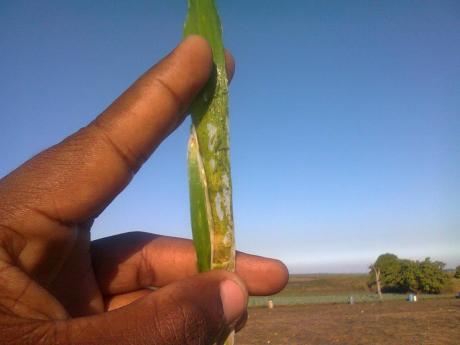Protecting plants is in our interest
Describing the International Year of Plant Health 2020 as a global eye-opener on taking preventative measures against plant pests and diseases, the Food and Agriculture Organization (FAO) representative to Jamaica, Dr Crispim Moreira, on Wednesday outlined actions to stave off the threats to our food security and agriculture sector.
With over 40 per cent of the earth’s plants affected by pest and diseases each year, limiting food supply and devastating the crops of small farmers on poor rural communities especially, there is urgent need for coordinated collaborative action to address this global issue, the FAO representative pointed out.
The FAO’s worked with Jamaican farmers to address the devastation wreaked by beet armyworm on onions and scallions had demonstrated beyond doubt that remedial action is oftentimes more costly and difficult to achieve than preventative action.
The deadly Tropical Race 4 (Panama disease) which affects bananas, plantains and heliconias has devastated banana plantations across Asia and Africa and most recently was detected in Colombia, a matter of concern for Dr Moreira.
“This makes it increasingly important for use to ensure that trade and travel do not become strengthened avenues for the spread of pests and diseases,” he warned. “By strictly adhering to international standards, we can help in ensuring that the phytosanitary controls in place to protect against threats can function effectively.”
The fact that plants feed the world in numerous and varied forms makes it one of mankind’s most precious assets, especially in ensuring nutrition, clean air and our overall well-being, which means their health cannot be taken lightly. Our reliance on them for about 80 per cent of the food we eat and 98 per cent of the oxygen we need to survive is a testament to the importance of healthy plant life and its impact on human health.
Dr Moreira pointed out that the combination of climate change and human activities have created loopholes for pests to thrive, and so we are now seeing plant pests earlier in the year and in new places, thereby promoting further loss of biodiversity.
“With only 200 of the 6,000 plant species used for food contributing to global food production, and with the Caribbean only accounting for a small fraction of that, the loss of biodiversity places our food security at great risk. It is crucial for us to control and further prevent plant health from deteriorating,” he appealed.
The FAO representative reminded his audience that as ordinary citizens we have a role to play in ensuring that we are not promoting the spread of pests and diseases by careless actions such as travelling with plants across borders, and appealed for cooperation on this global objective.
“In the decade remaining for us to achieve the Sustainable Development Goals, the protection of plants must remain one of our most important endeavours so that we can end hunger and reduce poverty, while protecting our environment and promoting economic growth. As we celebrate the International Year of Plant Health and even beyond 2020, let us keep in mind that we all have this call to protect plants and promote plant health so that we can protect life and have a future that is food secure,” he said.
Christopher Serju


